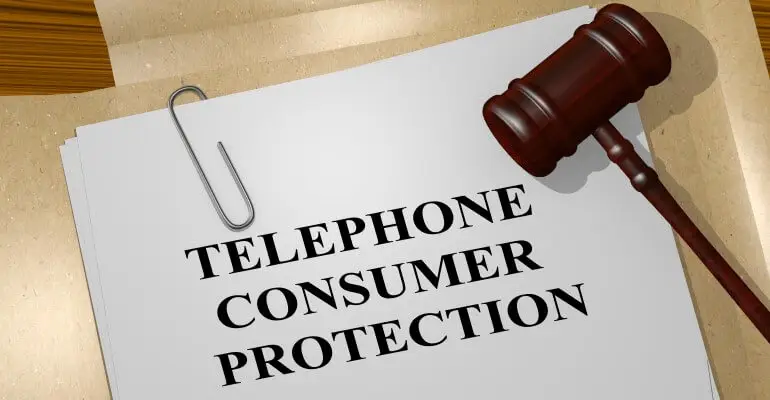Stopping Bad Robocalls Act: House Passes New TCPA Bill

Congress is responding accordingly. In recent months, members of the House and Senate have developed and passed legislation that would make necessary changes to the Telephone Consumer Protection Act. Keep reading to understand these changes, and how they may affect you.
What Does the New TCPA Law Mean for You?
It is important to understand that the House has merely passed the Stopping Bad Robocalls Act. The bill, H.R. 3375 now moves on to the Senate. In other words, the law hasn’t fully passed yet. These initial steps merely pave the way for potential changes to the current TCPA legislation.
That also means specific details may change in the future as the law develops. In general, however, the following points are particularly worth keeping in mind. They summarize many of the more noteworthy changes and modifications you should know.
Clearly Defining Robocalls
The current definition of robocalls (or calls made by an automatic telephone dialing system) is not sufficient. If the new law were to be fully passed, the FCC would have six months to clarify the definition, which is key to properly enforcing the law. It will also determine how and when exemptions can be granted.
Increasing Penalties
Violating the new TCPA law would theoretically result in more significant penalties than may have been incurred in the past. Currently, the FCC may seek up to $16,000 per violation. That number may be increased to $26,000 if new legislation becomes law. These changes would serve to protect consumers from intrusive and unwanted robocalls.
Changes to TCPA laws are not merely important to know as a consumer. If your business makes robocalls, you need to be aware of the consequences you may face if you fail to abide by changes to the TCPA law.
To that end, it is also worth noting that the new law would grant the FCC the power to adopt regulations which would clarify how (and the degree to which) consumers can withdraw consent to receive robocalls. Just because someone granted permission to call their number, that does not mean you have given the caller permission forever. They will likely be able to withdraw such consent whenever they choose.
Reconciling Bills
Members of the House are not the only lawmakers working on new TCPA legislation. Members of the Senate have also been hard at work on the Telephone Robocall Abuse Criminal Enforcement and Deterrence (TRACED) Act. This legislation, which was passed May 2019, shares many similarities with the House’s Bill. Now that the Stopping Bad Robocalls Act has moved to the Senate, it will likely be necessary to reconcile the two proposals before any final changes can be implemented.
What is clear is that business owners and marketers should be prepared for changes. The fact that members of both the House and Senate have developed legislation indicates an eagerness on both sides to address the robocall issue. While the specific means by which they do so are not yet set in stone, it is highly likely changes are coming. You might need to prepare accordingly.
That said, that may represent a benefit. On the one hand, some of the changes to the TCPA law may make it so that businesses and marketers have to be more vigilant about guarding against violations. On the other hand, failure to interpret and understand the TCPA law in its current state has caused significant headaches for marketers and business owners. At the very least, it is clear that lawmakers are committed to making necessary changes that would clarify the issue.
Changing the Definition of Called Party
As of now, the TCPA defines the “called party” as:
the current subscriber of the telephone number to which the call is made.
That may change if new legislation becomes law. Recognizing that many people share phones, the changes would redefine called parties to include not only current subscribers but also anyone who qualifies as a “customary user” of the number. Meaning, a call placed to someone who is not technically the current subscriber could potentially result in a violation depending on the circumstances.
What is most important to remember is that legislation is still developing. Again, at this stage, two different pieces of legislation must be combined (and potentially adjusted) before any final changes can be made. This is an ongoing story, but one worth following closely. You will be far more likely to understand how TCPA changes may impact you if you stay abreast of developments and prepare accordingly.
Believe you were a victim of TCPA violations? You could be entitled up to $1500 for each call. Speak to TCPA lawyer today.
Please Note: At the time this article was written, the information contained within it was current based on the prevailing law at the time. Laws and precedents are subject to change, so this information may not be up to date. Always speak with a law firm regarding any legal situation to get the most current information available.
Related Posts
Recent Posts
- False Claims Act Retaliation & Your Rights
- Fired for Being Pregnant? 5 Situations When You Should Call an Employment Lawyer
- Can My Boss Take My Tips? The Laws of Tip Ownership
- What Does “Meets FCRA Requirements” Mean?
- Can Your Employer Contact You While on Medical Leave? Know Your FMLA Rights in Florida
Contact Us

FREE HELP GUIDES
Dealing with unpaid wages, discrimination or wrongful termination? Get the information you need to protect your workplace rights. We offer employment law resources to help you fight for workplace justice.




